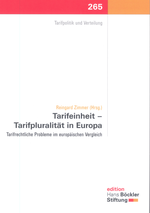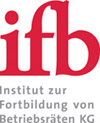 |
| Welcome to issue no. 4 / 2011 of EWC News. 27th December 2011
|
|
The
training and consultancy network
"euro-workscouncil.net"
EWC
News appears four times a year.
You can find past issues in the newsletter archives.
|
|
1.
European Commission sends out reminders
|
| Italy, Greece and Luxembourg have not yet transposed the EWC Directive
One of these procedures (against the Netherlands) was superfluous, since the legislative procedure had already been concluded and the new EWC legislation came into force on 15th November 2011. Following texts are available only in Dutch: In Luxembourg the government adopted the draft bill on 11th November 2011, which was submitted to parliament on 29th November 2011. The legislation has not yet been passed. Following texts are available only in French: Transposition is also underway in Greece. On the other hand the situation looks totally different in Italy where there were already problems after the adoption of the old EWC Directive (from the year 1994). The Italian legislator only took action after being summoned by the European Commission and passed the EWC legislation in 2002.
On 24th November 2011 the European Commission in Brussels decided to bring the Netherlands before the European Court of Justice. The litigation is for incorrect transposition of European Union regulations for participation rights on supervisory boards following transnational mergers.
The complaint arises from a legal claim made by a Dutch trade union dating from the year 2008. The Netherlands is a preferred location for foreign holding companies. Apart from fiscal considerations, the ability to avoid participation rights by these means also plays a role. An employee representation on the supervisory board can be elegantly avoided with just a small office or a "letter box" at Amsterdam airport, providing there are only a few employees within the Netherlands. For example EADS, the parent company of Airbus, or Ikea, the Swedish furniture group have hereby officially declared their company headquarters in the Netherlands. New EWC statistics from Brussels On 25th November 2011 the European Trade Union Institute (ETUI) in Brussels published new charts with statistical data. According to this, there are currently 995 European works councils in 932 cross-border enterprises (some companies have established more than one EWC). New release of German EWC legislation On 15th December 2011 the revised version of the German EWC act was published in the Federal Law Gazette. This is the first time that the complete legal text, in force since 18th June 2011, is available in one document. Earlier releases mentioned only the modified paragraphs.
|
|
2.
Practical tips: Provisions for changes in structure
|
|
Caution with adaptation clauses according to article 13
The provisions set down by law for changes in structure
Article 13 of the new EWC Directive states the following:
Where the structure of the Community-scale undertaking ... changes significantly, and either in the absence of provisions established by the agreements in force or in the event of conflicts between the relevant provisions of two or more applicable agreements, the central management shall initiate the negotiations referred to in Article 5 on its own initiative or at the written request of at least 100 employees or their representatives in at least two undertakings or establishments in at least two different Member States.
Composition of the Special Negotiating Body (SNB)
Article 5 of the new EWC Directive regulates the creation of the SNB for the first establishment of a European works council. When there is however a change in company structure, further members are added to the elected SNB members from each country: hereby each existing European works council sends at least three of its members into the SNB. So where there are changes in company structure there is an opportunity to put the whole EWC agreement to the test, to renegotiate and to substantially improve its’ quality. Even though the process may take up to three years, during this time the existing European works councils remain in office.
This is particularly important in old "voluntary" agreements, which were concluded for the first time before September 1996, or which were modified between June 2009 and June 2011. In these cases the request for renegotiation according to article 13 leads automatically to an improvement in the legal status, even if the actual contents of the EWC agreement remain unchanged (this does not apply however to EWC agreements under British law). The signing therefore, of an adaptation clause, which invalidates article 13, can only be strongly discouraged.
Adapatation clauses undermine employee negotiating power
Even if central management frequently argues that these clauses are merely a way of avoiding a long and bureaucratic procedure, the suggestions however are targeted at the quality of the EWC agreement. When a EWC signs such a clause it is giving up any “means of bargaining” without any compensation in return. N.B.: Often in the text proposed by management no express mention of Article 13 is made, even though it is to be invalidated!
Workshop on renegotiation of EWC agreements
|
| 3. Focus on the United Kingdom
|
|
First German-British EWC conference in London
Recent news from British companies
Since there is no legal basis for works councils or participation in the United Kingdom, the collective regulation of working conditions is only possible through trade union committees and on the basis of in-house collective agreements. Trade unions must first fight to be recognized as a party to collective bargaining in each individual company. Even though there has been legislation on the matter since the year 2000, the actual situation varies greatly from company to company. Some recent examples:
Largest labour dispute since the general strike in 1926
Whereas such nation-wide general strikes are quite frequent in Mediterranean countries due to the very extensive strike rights there, a British general strike comes as a real sensation. The many obstacles from the Thatcher legislation do not make it easy for British trade unions to fulfill the formal conditions. There had therefore to be held a strike ballot covering all potential strikers throughout the whole country.
Although the general strike on 30th November 2011 was dominated to a large extent by the public services, there are also problems with pension funds in the private sector. The British Ford subsidiary is now threatened with its first strike ballot since the 70's. Unilever, the world-wide consumer group is one step further, with strikes in several plants throughout England on 9th December 2011 in defense of pension rights. Support came also from their European works council. |
| 4. Further country reports
|
|
In spring 2011 an agreement was concluded between trade unions, employers and the government on the gradual increase in the pensionable age from 65 to 67 years. The subject is however highly controversial, both within the community as well as in the trade union confederation, FNV. There was a clash on 3rd December 2011, since from a total of 19 individual trade union federations, two of the federations with most members considered themselves to be insufficiently represented on the FNV governing board. The FNV will therefore undergo voluntary dissolution and put in place a completely new trade union organization before summer 2012, which will follow other rules than those currently in practice. With its 1.4 million members the social-democratic oriented FNV is the largest trade union confederation in the Netherlands; the Christian CNV has about 350,000 members. Romanian social partners set on self-organization
In September 2011 the largest part of the employers' associations left the national Economic and Social Council. With the new agreement social parties recognize each other mutually. In the future they would like to organize their co-operation autonomously and independent of state institutions.
  Portugal increases working time
by 30 minutes Portugal increases working time
by 30 minutesOn 7th December 2011, the Council of Ministers in
Lisbon adopted new working time regulations as part of anti-crisis
measures for rescuing the banks and the euro. Employers in the private
sector can hereby now extend the daily working time by 30 minutes,
without having to pay overtime. Employees in Portugal work therefore
3.5 hours longer per week than employees in Germany. Even in countries
such as Latvia, Slovenia and Romania the actual working time is now
lower than in Portugal.
|
|
5. Examples of EWC activities
|
| Chinese financial participation rejected on ethical grounds
There has been as yet, no known comparable case, where a European works council has rejected a minority investor on ethical grounds. The Chinese government would like to gain access to raw materials and an international reputation through capital investments. Since there are 1,500 European employees affected by the investment in the GdFSuez subsidiary in question, central management carried out an information and consultation procedure with the EWC. The opinion statement was prepared during two EWC meetings with the help of a consultancy company.
European works councils in commerce
French EWC wants to stop restructuring
using legal means
|
|
6. Newly
established European works councils
|
| Austrian Rail creates EWC
First
Belgian EWC establishment in new legal context
The first Italian EWC under the new legal context was established on 26th October 2011 in Rome. Cementir Holding, a building materials group, has 3,200 employees world-wide in 15 countries. A reference could only be made to the new EU Directive since there is still no EWC legislation in Italy (see report above). It is noticeable that the EWC agreement does not contain a definition for information and consultation in accordance with the new Directive.
The EWC is made up of 14 members: six from Italy, five from Denmark, one each from Norway and Sweden as well as an observer from Turkey. There is only one plenary meeting per year, and an additional annual right to two days training. A four-member steering committee deals with the day-to-day business.
After the establishment of a German works council SAP now also has a European works council. A EWC agreement was signed on 24th November 2011 at the company headquarters in Walldorf near Heidelberg. There will be employee representatives out of 27 countries in the EWC where Switzerland is not represented. It meets once per year.
The establishment of SAP’s EWC is remarkable for several reasons. Up to the year 2006, not even one local works council existed to cover the 14,000 employees at that time in Germany. The first election had to be legally enforced at that time. Members from the IG Metall union were responsible for taking this initiative. Following the establishment of the German works council, the ver.di trade union created a workplace union committee in competition with IG Metall, and which was, in turn, responsible for the establishment of the European works council. Both trade unions are members of the same confederation, the DGB, but they are however in competition when it comes to works council elections or to recruiting new members. The following texts are available only in German:
The question of the delimitation of organizational areas between the different DGB member trade unions is becoming more and more problematic in Germany. While in some companies the different trade unions co-operate well together there is strong competition elsewhere. Apart from the IT industry other sectors are concerned such as e.g. mobile communications, the energy industry, transport and industrial services. It does not take competing political confederations such as those in France, to produce the same problems as in France. |
|
7.
Updated EWC agreements
|
|
On 27th June 2011, Airbus’s EWC agreement was updated. The number of annual plenary meetings for the 18 EWC members was increased from two to four. One representative each from both suppliers, Aerolia and Premium Aerotec, participate as guests - these are subsidiaries, which were first spun-off but in the end not sold.
The new EWC agreement adopts the definition of information and consultation from the new EU Directive. The European works council of Airbus was created in 2001 under Dutch legislation. Strictly speaking it is only a Divisional European works council within the EADS group, which has itself a European works council of its own at the Holding level. Their EWC agreement was already adapted in October 2008 (see report in EWC News 1/2009).
Supermarket chain strengthens the steering committee
Groupama, the French insurance and banking group updated its EWC agreement on 2nd December 2011. The working means of the EWC have been improved. Language courses are now expressly provided. Although the company has its headquarters in France, the employee chairperson (= EWC secretary) is located in Italy. |
|
8. News on SE legal form
|
|
On 4th July 2011, the European Commission in Brussels started the first phase of consultations on the planned revision of the SE Directive (see report in EWC News 2/2010). Employers' associations and trade unions were requested to give their position on selected questions. According to analysis from Ernst & Young, most SE companies are at present located in Czechia and in Germany (see chart). Whereas in Prague, specialized law firms offer empty SE shells for sale, in Germany the freezing of employee participation in supervisory boards is the main driving force (see report in EWC News 4/2010). This is covered in a new expert report from the union friendly SE-Europe Network in Brussels. BusinessEurope, the umbrella organization of European employers' associations, submitted its opinion on 6th October 2011 and spoke out against a revision of the current Directive. The European Trade Union Confederation (ETUC) replied on 28th October 2011 with a detailed position paper and identified the shortcomings of the current legal situation. These position statements will be now fed into the ongoing legislative process.
The SE revision scenario reminds us of the EWC revision
The present situation after the first phase of consultations shows parallels with the revision of the EWC Directive (see report in EWC News 3/2007). At that time it was precisely the employers' associations who completely refused any change in the legal basis for the European works council, until April 2008 when finally the European Commission itself took the initiative. In summer 2008 then a politically controversial agreement was reached between the social partners behind the scenes through an accelerated procedure (see report in EWC News 3/2008).
The legal insurance division of ARAG was converted into a European company (SE) on 1st December 2011 just in time before the company reached the threshold of 2,000 employees for the formation of a parity-based supervisory board. As is the case for many SE transformations the one-third participation in the supervisory board is thereby frozen. The Holding of the family business remains even completely free of participation. An appropriate agreement was signed on 7th October 2011 at the company headquarters in Düsseldorf (photo). In the future two German and one Dutch employee representative will sit on the supervisory board of the legal insurance division.
The 3,400 European employees are represented by a SE works council, which meets twice annually. It is composed of representatives from Germany, Austria, Slovenia, Italy, Spain, Portugal, Greece, Belgium, the Netherlands and the United Kingdom. They elect a steering committee of four members. One particularity of the agreement: all members of the SE works council have the same protection as a German works council.
Seminar on the organization of consultation procedures
|
|
9. The view beyond Europe
|
| First world-wide pharmaceutics
meeting
Delegates from Europe, Brazil and Asian countries met together in Amsterdam on 23rd and 24th November 2011 to put in place a global network in the Dutch electronics group. Central management is under criticism for its lack of information on planned plant closures in the Lighting Division which were announced on 17th October 2011.
First international framework agreement in the Catering industry
|
| 10.
Interesting websites
|
|
Capio, the Swedish hospital chain established the first European works council in the private healthcare system in June 2006. The company which has in the meantime been bought by financial investors operates around 100 clinics in eight European Union countries and wants to expand further by acquisitions. The EWC meetings which are held twice per year are regularly documented on the company’s Internet site. Industrial
relations in Scandinavia   The
Nordic Labour Journal is an English-language on-line publication which
provides up-to-date information on the working life in the Nordic
countries (trade unions, labour legislation, collective bargaining,
unemployment etc.). It is published by a research institute in Oslo on
behalf of the Nordic Council of Ministers. A free newsletter is also
available. The
Nordic Labour Journal is an English-language on-line publication which
provides up-to-date information on the working life in the Nordic
countries (trade unions, labour legislation, collective bargaining,
unemployment etc.). It is published by a research institute in Oslo on
behalf of the Nordic Council of Ministers. A free newsletter is also
available.
Global responsibility within the computer industry
Violation of human and trade union rights throughout the world
We have arranged various further interesting web-pages into a collection of links.
|
| 11.
New publications |
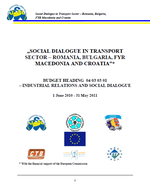  Social
dialogue in South East Europe Social
dialogue in South East Europe
A project on social dialogue within the transport industries of Romania, Bulgaria, Macedonia and Croatia and financially supported by the European Union was concluded in May 2011. UNITATEA, the transport workers’ trade union in Bucharest, which had coordinated the project, submitted not only a comprehensive report on the workshops, but developed also a handbook on social dialogue in the four participating countries. These publications are available in five languages. 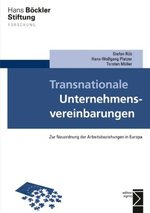  Beyond Information and
Consultation Beyond Information and
Consultation
While the legislator limits European works councils to information and consultation, many are already a step further. To an increasing extent company agreements are concluded which regulate, on a European level, issues such as e.g. occupational safety, profit-sharing, foreward-looking personnel planning or the framework conditions for restructuring (see recent examples in EWC News 3/2011). This study which was published in September 2011 examines the negotiation processes and the interaction between the EWC and trade unions for such agreements in a total of ten companies. The main emphasis is on the metal industry, but the chemical group, Bayer and the banking group, Unicredit are also presented. The book is only available in German language.
A collection was also released in September 2011 which analyzes the collective bargaining systems in seven countries of the European single market. The starting point of the publication was a ruling of the Federal Labour Court from June 2010 which terminated the unity of collective bargaining and thus paved the way for a further disintegration of the bargaining system in Germany (see report in EWC News 2/2010). The German-language book published by the Hans Böckler Foundation was edited by Dr. Reingard Zimmer. This labour lawyer has also been working for many years with the training and consultancy network "euro-worskcouncil.net".   Board-level representation:
up-to-date country comparison Board-level representation:
up-to-date country comparisonIn November 2011, the European Trade Union Institute, (ETUI), presented this analysis of the legal situation of employee representatives in supervisory boards and/or board of directors. According to it there are regulations on such participation rights in 17 European Union countries as well as in Norway. The book also offers an overview of the different models of Corporate Governance and of current political discussions and trends for the extension or restriction of employee involvement. A separate chapter is dedicated to the new legal form of the European Company (SE) and lists all the relevant companies, which have so far concluded a SE participation agreement. The book is available in English and German. We have made a collection of further technical literature on a literature website.
|
| 12. Training and Consultancy
Network “euro-workscouncil.net”:
further examples of our work
|
  Regional exchange of experience on EWC Regional exchange of experience on EWC
On 3rd November 2011 around 25 employee representatives from Austria and north Italy met in the Neustift monastery in South Tyrol (photo), for an exchange of experience on their European works councils. There were also some metal industry companies participating from South Tyrol that have yet to establish their EWC. Wolfgang Greif from the GPA trade union in Vienna and Werner Altmeyer from “euro-workscouncil.net”, the training and consultancy network in Hamburg, were available as experts. German Italian EWC Workshop in South Tyrol  In
co-operation with partners from South Tyrol and Italy,
“euro-workscouncil.net”, the training and
consultancy
network is running a workshop on 27th and 28th September 2012 in
Bolzano for members of European works councils. In
co-operation with partners from South Tyrol and Italy,
“euro-workscouncil.net”, the training and
consultancy
network is running a workshop on 27th and 28th September 2012 in
Bolzano for members of European works councils.SE works council starts new term of office with EU-project   During
a meeting in Hamburg on 5th December 2011 the SE works council of the
Donata Holding SE planned its project activities. It will hold a
constitutional meeting in January 2012 for its new term of office and
will begin with a training and consultancy project financially
sponsored by the EU. With the help of
“euro-workscouncil.net”, the training and
consultancy
network, the representatives are to be made ready and fit for their
future jobs. A whole collection of perfume brands such as Calvin Klein,
Davidoff, David Beckham, Jil Sander, Joop and Lancaster lie under the
control of the Donata Holding SE and its US subsidiary Coty. Coty has
branch offices in 16 European Union countries, Switzerland and Monaco. During
a meeting in Hamburg on 5th December 2011 the SE works council of the
Donata Holding SE planned its project activities. It will hold a
constitutional meeting in January 2012 for its new term of office and
will begin with a training and consultancy project financially
sponsored by the EU. With the help of
“euro-workscouncil.net”, the training and
consultancy
network, the representatives are to be made ready and fit for their
future jobs. A whole collection of perfume brands such as Calvin Klein,
Davidoff, David Beckham, Jil Sander, Joop and Lancaster lie under the
control of the Donata Holding SE and its US subsidiary Coty. Coty has
branch offices in 16 European Union countries, Switzerland and Monaco.Academy for European works councils established   On 20th December 2011 EWC Academy GmbH
(Ltd Company) was founded in Hamburg. During 2012 it will gradually
take over responsibility for all conferences, training courses and
consulting services of the “euro-workscouncil.net”.
The new
academy has its headquarters in Stella-House (photo) between the River
Alster and the inland port, in sight of the historical warehouse
district and of the new Elbe Philharmonic Hall. In the Hanseatic city
the edifice is considered to be the most beautiful and most elegant
expressionist example of an office building. On 20th December 2011 EWC Academy GmbH
(Ltd Company) was founded in Hamburg. During 2012 it will gradually
take over responsibility for all conferences, training courses and
consulting services of the “euro-workscouncil.net”.
The new
academy has its headquarters in Stella-House (photo) between the River
Alster and the inland port, in sight of the historical warehouse
district and of the new Elbe Philharmonic Hall. In the Hanseatic city
the edifice is considered to be the most beautiful and most elegant
expressionist example of an office building. |
|
13.
Current seminar schedule
|
|
The training and consultancy network “euro-workscouncil.net” has been organizing and delivering conferences and seminars for the members of European works councils, SE works councils and special negotiation bodies since January 2009. So far 347 employee representatives from 155 companies have taken part (representing 16% of all companies in Europe with an established EWC). For the year 2012 a training brochure is now available in German, giving an overview of the planned events:
As every year, a two-day conference is being organised in Hamburg covering following topics:
Monday, 23rd January 2012: New standards for information, consultation and participation
Employee representation in Central and Eastern Europe
EWC seminar on the implementation of consultation procedures  A
seminar is being organized from 10th to 13th April 2012 on Montabaur
Castle (photo) which highlights the new legal situation for information
and consultation in the context of restructuring. How does a European
works council concretely carry out the consultation procedure and
prepare a legally binding opinion? This seminar is also appropriate for
SE works councils.
A
basic seminar will again be held in parallel. It is aimed at newly
elected European works council members and at works council members
seeking information on the establishment of a EWC.
Seminars of the Institute for Further Education of Works Councils (ifb)
Basic seminar: The European Works Council from A to Z 21. – 25.05.2012 in Hamburg 26. – 30.11.2012 in Cologne
Advanced seminar: In depth workshop and exchange of ideas 04. – 08.06.2012 in Hamburg 03. – 07.12.2012 in Erfurt
In 2011 the training and consultancy network "euro-workscouncil.net" will be organising another SE workshop. Since the number of SE works councils is still relatively small, the next date will be coordinated with any interested participants by telephone. Anybody interested should please fill in and return the following questionnaire.
In-house events Please find a summary of possible topics for in-house events here: |
| 14. Imprint
|
EWC News is published by:
Training and consultancy network "euro-betriebsrat.de" GbR Von-der-Tann-Straße
4, D-20259 Hamburg www.euro-workscouncil.net (English) www.euro-ce.org (French)
Authors collaborating on this issue: Werner Altmeyer, Sandro Maier, Bernhard Stelzl, Reingard Zimmer
Distributor of the German version: 16,809 readers Distributor of the English version: 2,366 readers Distributor of the French version: 2,469 readers
Newsletter archive: www.ewc-news.com
We are always pleased to receive comments and suggestions in relation to this newsletter as well as reports on your EWC activities. Please write us at: info@euro-workscouncil.net
|



 One
of the most important improvements of the new EWC Directive is the
legal right to a renegotiation of the agreement after "changes in
structure" of the company (mergers, spin-offs, closures, delocalization
of company headquarters). With a view to removing this legal right many
companies - above all British and American – are currently
trying to persuade their European works councils to sign an adaptation
clause to their EWC agreement. What legal rights do employee
representatives lose if they thoughtlessly sign such clauses?
One
of the most important improvements of the new EWC Directive is the
legal right to a renegotiation of the agreement after "changes in
structure" of the company (mergers, spin-offs, closures, delocalization
of company headquarters). With a view to removing this legal right many
companies - above all British and American – are currently
trying to persuade their European works councils to sign an adaptation
clause to their EWC agreement. What legal rights do employee
representatives lose if they thoughtlessly sign such clauses?











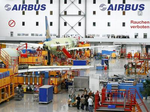


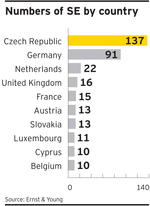





 Several
websites of partners from the GoodElectronics network are dedicated to
the improvement of living and working conditions of employees in the
computer industry of developing countries. A goal is for example to
ensure that social and ecological minimum requirements are applied when
purchasing computers.
Several
websites of partners from the GoodElectronics network are dedicated to
the improvement of living and working conditions of employees in the
computer industry of developing countries. A goal is for example to
ensure that social and ecological minimum requirements are applied when
purchasing computers.
